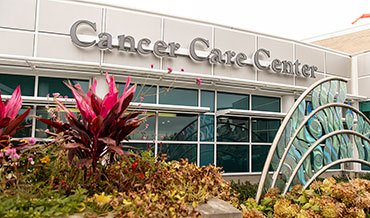Chemotherapy, often shortened to chemo, uses drugs to kill cancer cells and slow down their growth. You may receive a single drug or a combination of chemotherapy drugs to treat your cancer.
How Chemotherapy Treatments Work at Rush
If your doctors have determined that chemotherapy is the best treatment for your cancer, your care team will create a personalized care plan that includes the specific drugs that will be the most effective. Chemotherapy is often given in cycles, with the number of treatments in each cycle and the number of cycles varying.
We make every effort to respect your privacy and keep you comfortable during treatments with our semi-private infusion stations. Each station has a reclining chair and television, and room for your family or support companion.
Our cancer experts will monitor you closely during your infusions in case you experience any side effects or reactions.
Physical, Emotional and Spiritual Support During Treatment
Our cancer team is committed to caring for you as a whole person. We offer a variety of support services for you and your family during and after the course of your chemotherapy treatments, including the following:
- A social worker will meet with you and your family members to help you learn more about the cancer resources at Rush and in your community, locate financial assistance, access wigs and find prosthesis resources and connect you with survivors and support groups, and help you with your emotional and spiritual needs.
- Complementary and alternative therapies, such as acupuncture and massage, to reduce pain, stress and other symptoms
- Nutrition counseling to help address how to main your weight and loss of appetite often associated with chemo.
Chemotherapy Side Effects
These are some common chemotherapy side effects:
- Sore mouth
- Nausea and vomiting
- Diarrhea
- Low blood cell counts, which can increase your risk for infection and anemia
- Hair loss
Chemotherapy Medications
Chemotherapy drugs are grouped (classified) by their chemical nature and how they work. Below are some of the main classes. Many chemotherapy treatments will combine drugs from different classes.
- Alkylating agents like cyclophosphamide, also known as Cytoxan, prevent cells from reproducing. They are often used to treat breast cancer, blood cancers and bone cancer (sarcoma).
- Anthracyclines, such as doxorubicin, damage proteins that cells need to reproduce. They are used to treat many cancers, including ovarian cancer, lung cancer and blood cancers.
- Antimetabolites, such as methotrexate and Xeloda, mimic nutrients that cells need to grow. Without proper nutrients, the cells cannot divide and eventually die. These drugs are commonly used to treat leukemia, breast cancer and colorectal cancer.
- Plant alkaloids, such as vincristine and the taxanes (paclitaxel and docetaxel) attack cells while they are dividing. Vincristine is often used to treat blood cancers. The taxanes are used to treat breast cancer, lung cancer and ovarian cancer.
- Topoisomerase inhibitors, such as irinotecan and etoposide, interfere with the proteins that cells need to divide. These drugs are often used to treat gastrointestinal cancer and lung cancer.
Rush Excellence in Chemotherapy
- Nationally ranked cancer care: U.S. News & World Report ranked Rush University Medical Center among the best in the nation for cancer care.
- Experts focused on your body, mind and spirit: Rush cancer specialists will work with you to create a personalized treatment plan. Depending on which type of cancer you have, your treatment may include chemotherapy, alone or in combination with other treatments like radiation therapy or surgery. Your team will take your goals, wishes and lifestyle into account when planning your care. We treat you as a whole person and you can find support and resources from the early stage of treatment through survivorship — along with your loved ones at the Waterford Place Cancer Resource Center at Rush Copley Medical Center. At the Virtual Salon & Spa at Waterford Place, oncology-trained providers work with you to offer safe, stress-relieving services including skin and hair care consultations. The wig boutique and salon offer virtual wig-fitting services and contactless pickup of wigs, cosmetics and hair care supplies.
- Opportunity to participate in trials for new therapies: If you are undergoing chemotherapy for your cancer, you will have access to clinical trials — many of which are changing the standard of care and are not available elsewhere in the Chicago area. These trials may offer you new options if your cancer has not responded to standard treatment.
- Leading-edge chemotherapy treatment for melanoma: Chemotherapy drugs are usually not as effective against melanomas as they are for other types of cancers, so treatment requires more highly concentrated doses that cause more intense side effects. The Rush University Medical Center cancer program is one of few medical centers that offers isolated limb infusion (ILI) for treatment of melanoma. ILI is a minimally invasive procedure that delivers high doses of chemotherapy to an affected limb but spares the rest of the body from the toxicity of chemotherapy. Rush has one of only 30 surgeons in the country who perform ILI. A leading study found that ILI saves limbs, extends lives and is well tolerated by most people.
- Innovative ways to limit side effects: For many patients, one of the most devastating side effects of chemotherapy is hair loss. Depending on the type of chemotherapy you receive, you may be able to use innovative cooling cap technology that reduces hair loss from chemotherapy.





